Local
Gallaudet official blasts school, hints at lawsuit
Lesbian faculty members named as ‘instigators’ for placing McCaskill on leave
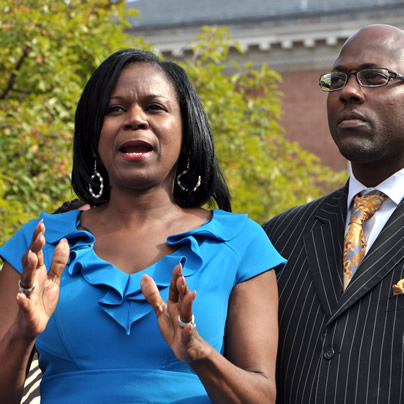
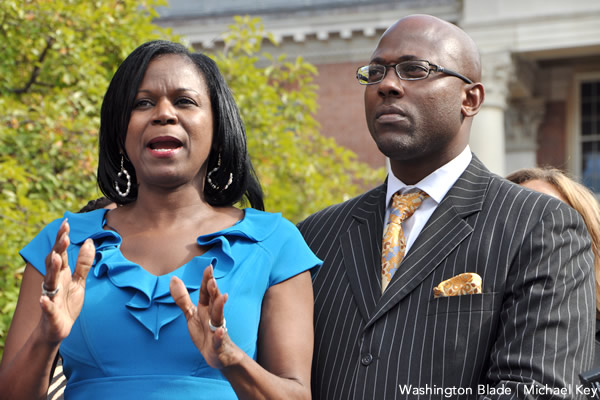
Gallaudet University chief diversity officer Angela McCaskill this week denounced a decision by the school to put her on leave after she signed an anti-gay petition in Maryland. (Washington Blade photo by Michael Key)
ANNAPOLIS, Md. — Gallaudet University’s chief diversity officer said her reputation was unfairly “tarnished” last week when the university placed her on paid administrative leave for signing a petition in July to place Maryland’s same-sex marriage law on the ballot in a voter referendum.
At a news conference outside the Maryland State Capitol Building in Annapolis, Angela McCaskill, who served as Gallaudet’s Associate Provost of Diversity and Inclusion, identified two out lesbian faculty members as the ones she claims persuaded Gallaudet President T. Alan Hurwitz to suspend her from her job.
She identified the faculty members as Martina “MJ” Bienvenu and Kendra Smith, saying the two are partners and wrote a joint letter to Hurwitz asking that she be reprimanded.
The Blade sent e-mails to Bienvenu and Smith seeking their version of what role they may have played in McCaskill’s suspension. The two responded late Wednesday with a one-sentence statement released by Gallaudet spokesperson Catherine Murphy.
“At this time, we would prefer this matter be a discussion between the University and Dr. Angela McCaskill,” the statement says.
“I was shocked, hurt, insulted. I was humiliated,” McCaskill said, adding that Hurwitz sought to punish her for merely exercising her private right as a Maryland resident to sign a petition to allow voters to make the final decision on whether the same-sex marriage law should be retained or overturned.
“They have attempted to intimidate me and tarnish my reputation,” she said.
McCaskill, speaking in sign language, delivered her comments through an interpreter.
She declined to disclose her position on same-sex marriage or whether she will vote for or against the marriage equality law in the Nov. 6 referendum.
McCaskill’s news conference came hours after the university released a statement saying it wants to talk to McCaskill about reaching an agreement that could lead to her reinstatement.
Her attorney, J. Wyndal Gordon, told the news conference McCaskill suffered damages by the university’s action and she would seek compensation for the damages. He declined to say whether McCaskill planned to file a lawsuit and seek monetary compensation.
“We will gladly meet with them,” he said of the university offer to discuss ways to reinstate McCaskill.
Gordon stated repeatedly that McCaskill remains neutral on the gay marriage ballot referendum. He said her decision to sign the petition to place the marriage question on the ballot was based on her strong belief that all controversial issues should be put before voters in Maryland.
“I fully support the members of the LGBT community as I support all groups across Gallaudet and its community,” McCaskill told the news conference.
“When I assumed my position we had an LGBTQA Resource Center that had been formed without funding,” she said. “It was simply an office. I relocated resources to provide support for the center because I believe that members of the LGBTQA community deserve more.”
McCaskill, 54, said she has worked at Gallaudet for 24 years. Her biography on the university website says she is the first deaf African-American woman to earn a Ph.D. from Gallaudet.
Tuesday’s news conference marked the first time McCaskill has spoken publicly about her suspension since the university community first learned about it on Oct. 10 through a statement released by Hurwitz.
“It recently came to my attention that Dr. McCaskill has participated in a legislative initiative that some feel is inappropriate for an individual serving as Chief Diversity Officer; however, other individuals feel differently,” Hurwitz said.
“I will use the extended time while she is on administrative leave to determine the appropriate next steps taking into consideration the duties of this position at the university,” he said. “In the meantime an interim Chief Diversity Officer will be announced in the near future.”
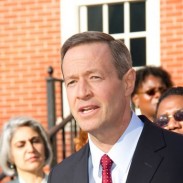
Maryland Gov. Martin O’Malley has called for the reinstatement of Gallaudet University official Angela McCaskill. (Washington Blade file photo by Pete Exis)
Since making that announcement, Hurwitz has come under fire from both supporters and opponents of the Maryland marriage equality law. Maryland Gov. Martin O’Malley, a strong supporter of the same-sex marriage law, and Josh Levin, chair of Marylanders for Marriage Equality, the lead group campaigning to retain the same-sex marriage law, have called on Gallaudet to immediately reinstate McCaskill.
The anti-gay Family Research Council and the Maryland Marriage Alliance, two groups urging voters to overturn the marriage equality law in the November referendum, have cited McCaskill’s suspension as a predictor of what will happen if the law is upheld and takes effect in January.
“Homosexual activists continue to cry that individual and religious liberties are not at risk,” said Maryland Marriage Alliance Chair Derek McCoy in a statement released on Tuesday. “The suspension of Dr. McCaskill is proof of the disingenuous and untruthful nature of that argument.”
In a full-page ad published Tuesday in the Annapolis daily newspaper The Capital, Marylanders for Marriage Equality disputed McCoy’s assertion.
“Unfortunately, opponents of marriage equality are trying to make what happened to Dr. McCaskill about Question 6, the November ballot measure that will allow gay and lesbian couples to get a civil marriage license and protects religious freedom,” the ad states.
“But her suspension from a D.C. university has nothing to do with Question 6 in Maryland,” the ad says. “It does however have everything to do with being able to express one’s opinions, freely, and participate in the political process…Question 6 is about fairness and equality under the law, and it’s only fair Dr. McCaskill get her job back.”
McCaskill’s decision to sign the referendum petition was first reported by the blog Planet DeafQueer, which is widely read nationally in the LGBT deaf community.
The blog reported that an unidentified faculty member reportedly found McCaskill’s name on a database list of all signers of the petition that was released by the Maryland board of elections and published by the Washington Blade.
At Tuesday’s news conference in Annapolis, neither McCaskill nor Gordon, her attorney, identified Bienvenu or Smith as the faculty members who discovered McCaskill’s name on the database of petition signers.
But McCaskill told of how the two faculty members played a key role in what she described as a “tremendously horrific” two-week period in which her 24-year career at the university was shaken.
“This nightmare began two weeks ago on Wednesday, Oct. 3, when I was approached by a faculty member of Gallaudet University whose name is Martina Bienvenu,” McCaskill said.
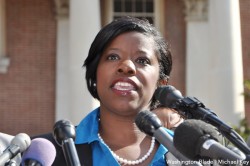
Maryland State Rep. Aisha Braveboy also spoke at the press conference. (Washington Blade photo by Michael Key)
“She asked if I had signed a petition to put the question of same-sex marriage on the ballot as a referendum,” McCaskill continued. “I responded that I had, that I did sign such a petition. In this very moment, she determined that the signature meant that I was anti-gay. No one has the right to decide what my signature meant,” she said. “Only I can do that.”
Added McCaskill, “MJ, Dr. Bienvenu and her partner, Kendra Smith, wrote a letter to the president of the university asking that I be reprimanded.”
Their biographies posted on the Gallaudet website state that both hold a Ph.D., with Bienvenu serving as a professor of “ASL and Deaf Studies” and Smith serving as an assistant professor of counseling. Both have been involved in academic-related projects involving LGBT deaf people, according to the biographies.
Planet DeafQueer reported in an Oct. 8 posting that LGBT students, who considered McCaskill a friend and ally in her role as chief diversity officer, were shocked when they learned she had signed a petition to place the marriage equality law on the ballot in a referendum.
The blog posting said LGBT students and faculty believed it was inappropriate for the school’s diversity officer to take such an action, which they viewed as an endorsement of the campaign to defeat the marriage equality law.
LGBT activists in Maryland have pointed out that the signature gathering effort to place the marriage equality law on the ballot was organized and carried out by people who oppose same-sex marriage.
But Gordon, McCaskill’s attorney, said at the news conference Tuesday that it would be incorrect to label McCaskill as being anti-gay or an opponent of gay marriage.
“Her signature on the same-sex marriage petition referendum that she signed in July 2012 merely represented her desire to, one, have this matter decided through the Maryland democratic process; two, allow Maryland citizens to become more informed on the issue through public discourse; and three, to enable Maryland citizens to cast their votes after thoroughly examining the issues and making an informed decision,” he said.
“Signing a petition to have same-sex marriage placed on the November ballot in Maryland’s general election no more interferes or compromises Dr. McCaskill’s integrity or qualifications as the Chief Diversity Officer than it would if she signed a petition to place affirmative action or any other controversial issue on the November ballot.”
Greg Nevins, an attorney with the gay litigation group Lambda Legal Defense and Education Fund, said an employer such as a university could establish restrictions on an employee’s public actions under certain circumstances.
“I would say people can vote the way they want to,” Nevins said. “But as far as putting yourself out in a public way, if it’s contrary to your job description – the things that you should be portraying and the employer’s position – they can take action against you.”
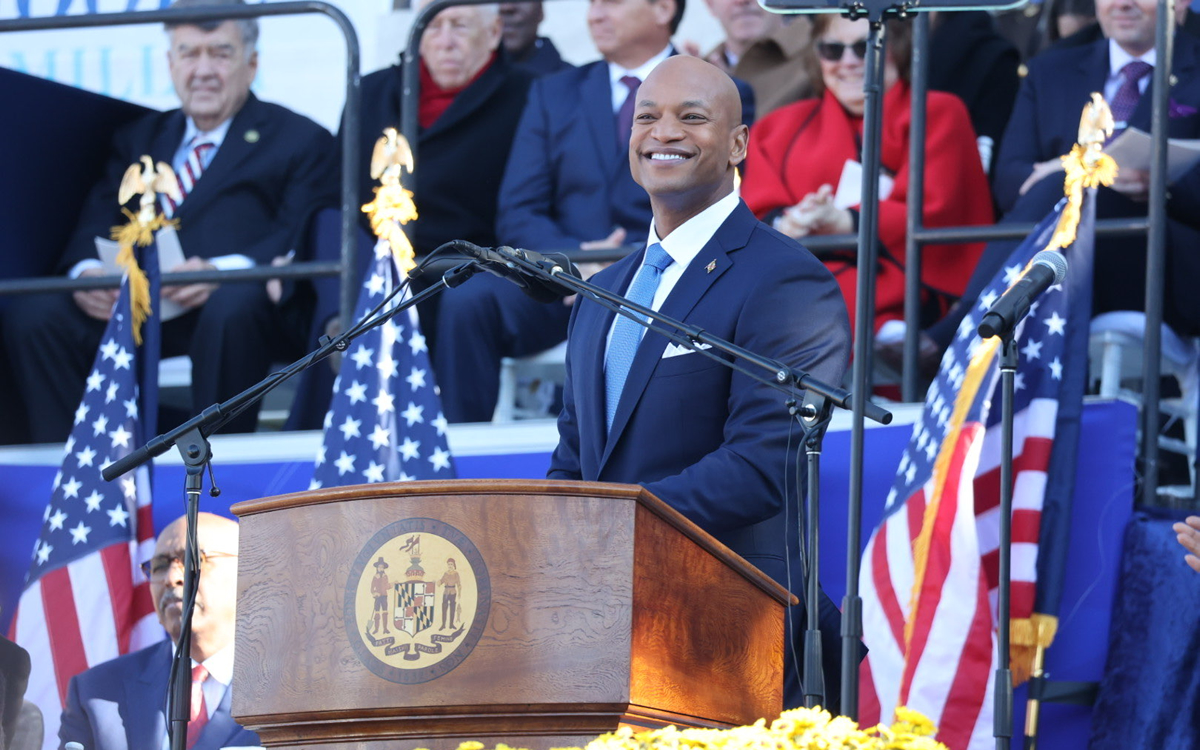
Maryland Gov. Wes Moore on Thursday signed a bill that seeks to combat efforts to ban books from state libraries.
House Bill 785, also known as the Freedom to Read Act, would establish a state policy “that local school systems operate their school library media programs consistent with certain standards; requiring each local school system to develop a policy and procedures to review objections to materials in a school library media program; prohibiting a county board of education from dismissing, demoting, suspending, disciplining, reassigning, transferring, or otherwise retaliating against certain school library media program personnel for performing their job duties consistent with certain standards.”
Moore on Thursday also signed House Bill 1386, which GLSEN notes will “develop guidelines for an anti-bias training program for school employees.”
District of Columbia
Catching up with the asexuals and aromantics of D.C.
Exploring identity and finding community

There was enough commotion in the sky at the Blossom Kite Festival that bees might have been pollinating the Washington Monument. I despaired of quickly finding the Asexuals and Aromantics of the Mid-Atlantic—I couldn’t make out a single asexual flag among the kites up above. I thought to myself that if it had been the Homosexuals of the Mid-Atlantic I would’ve had my gaydar to rely on. Was there even such a thing as ace-dar?
As it turned out, the asexual kite the group had meant to fly was a little too pesky to pilot. “Have you ever used a stunt kite?” Bonnie, the event organizer asked me. “I bought one. It looked really cool. But I can’t make it work.” She sighed. “I can’t get the thing six feet off the ground.” The group hardly seemed to care. There was caramel popcorn and cookies, board games and head massages, a game of charades with more than its fair share of Pokémon. The kites up above might as well have been a coincidental sideshow. Nearly two dozen folks filtered in and out of the picnic throughout the course of the day.
But I counted myself lucky that Bonnie picked me out of the crowd. If there’s such a thing as ace-dar, it eludes asexuals too. The online forum for all matters asexual, AVEN, or the Asexual Visibility and Education Network, is filled with laments: “I don’t think it’s possible.” “Dude, I wish I had an ace-dar.” “If it exists, I don’t have it.” “I think this is just like a broken clock is right twice a day type thing.” What seems to be a more common experience is meeting someone you just click with—only to find out later that they’re asexual. A few of the folks I met described how close childhood friends of theirs likewise came out in adulthood, a phenomenon that will be familiar to many queer people. But it is all the more astounding for asexuals to find each other this way, given that asexual people constitute 1.7% of sexual minorities in America, and so merely .1% of the population at large.
To help other asexuals identify you out in the world, some folks wear a black ring on their middle finger, much as an earring on the right ear used to signify homosexuality in a less welcoming era. The only problem? The swinger community—with its definite non-asexuality—has also adopted the signal. “It’s still a thing,” said Emily Karp. “So some people wear their ace rings just to the ace meet-ups.” Karp has been the primary coordinator for the Asexuals and Aromantics of the Mid-Atlantic (AAMA) since 2021, and a member of the meet-up for a decade. She clicked with the group immediately. After showing up for a Fourth of July potluck in the mid-afternoon, she ended up staying past midnight. “We played Cards against Humanity, which was a very, very fun thing to do. It’s funny in a way that’s different than if we were playing with people that weren’t ace. Some of the cards are implying, like, the person would be motivated by sex in a way that’s absurd, because we know they aren’t.”
Where so many social organizations withered during the pandemic, the AAMA flourished. Today, it boasts almost 2,000 members on meetup.com. Karp hypothesized that all the social isolation gave people copious time to reflect on themselves, and that the ease of meeting up online made it convenient as a way for people to explore their sexual identity and find community. Online events continue to make up about a third of the group’s meet-ups. The format allows people to participate who live farther out from D.C. And it allows people to participate at their preferred level of comfort: while many people participate much as they would at an in-person event, some prefer to watch anonymously, video feed off. Others prefer to participate in the chat box, though not in spoken conversation.
A recent online event was organized for a discussion of Rhaina Cohen’s book, “The Other Significant Others,” published in February. Cohen’s book discusses friendship as an alternative model for “significant others,” apart from the romantic model that is presupposed to be both the center and goal of people’s lives. The AAMA group received the book with enthusiasm. “It literally re-wired my brain,” as one person put it. People discussed the importance of friendship to their lives, and their difficulties in a world that de-prioritized friendship. “I can break up with a friend over text, and we don’t owe each other a conversation,” one said. But there was some disagreement when it came to the book’s discussion of romantic relationships. “It relegates ace relationships to the ‘friend’ or ‘platonic’ category, to the normie-reader,” one person wrote in the chat. “Our whole ace point is that we can have equivalent life relationships to allo people, simply without sex.” (“Allo” is shorthand for allosexual or alloromantic, people who do experience sexual or romantic attraction.)
The folks of the AAMA do not share a consensus on the importance of romantic relationships to their lives. Some asexuals identify as aromantic, some don’t. And some aromantics don’t identify as asexual, either. The “Aromantic” in the title of the group is a relatively recent addition. In 2017, the group underwent a number of big changes. The group was marching for the first time in D.C. Pride, participating in the LGBTQ Creating Change conference, and developing a separate advocacy and activism arm. Moreover, the group had become large enough that discussions were opened up into forming separate chapters for D.C., Central Virginia, and Baltimore. During those discussions, the group leadership realized that aromantic people who also identified as allosexual didn’t really have a space to call their own. “We were thinking it would be good to probably change the name of the Meetup group,” Emily said. “But we were not 100% sure. Because [there were] like 1,000 people in the group, and they’re all aces, and it’s like, ‘Do you really want to add a non-ace person?’” The group leadership decided to err on the side of inclusion. “You know, being less gatekeep-y was better. It gave them a place to go — because there was nowhere else to go.”
The DC LGBT Center now sponsors a support group for both asexuals and aromantics, but it was formed just a short while ago, in 2022. The founder of the group originally sought out the center’s bisexual support group, since they didn’t have any resources for ace folks. “The organizer said, you know what, why don’t we just start an ace/aro group? Like, why don’t we just do it?” He laughed. “I was impressed with the turnout, the first call. It’s almost like we tapped into, like, a dam. You poke a hole in the dam, and the water just rushes out.” The group has a great deal of overlap with the AAMA, but it is often a person’s first point of contact with the asexual and aromantic community in D.C., especially since the group focuses on exploring what it means to be asexual. Someone new shows up at almost every meeting. “And I’m so grateful that I did,” one member said. “I kind of showed up and just trauma dumped, and everyone was really supportive.”
Since the ace and aro community is so small, even within the broader queer community, ace and aro folks often go unrecognized. To the chagrin of many, the White House will write up fact sheets about the LGBTQI+ community, which is odd, given that when the “I” is added to the acronym, the “A” is usually added too. OKCupid has 22 genders and 12 orientations on its dating website, but “aromantic” is not one of them — presumably because aromantic people don’t want anything out of dating. And since asexuality and aromanticism are defined by the absence of things, it can seem to others like ace and aro people are ‘missing something.’ One member of the LGBT center support group had an interesting response. “The space is filled by… whatever else!” they said. “We’re not doing a relationship ‘without that thing.’ We’re doing a full scale relationship — as it makes sense to us.”
CJ Higgins is a postdoctoral fellow with the Alexander Grass Humanities Institute at Johns Hopkins University.
District of Columbia
Bowser budget proposal calls for $5.25 million for 2025 World Pride
AIDS office among agencies facing cuts due to revenue shortfall

D.C. Mayor Muriel Bowser’s proposed fiscal year 2025 budget includes a request for $5.25 million in funding to support the June 2025 World Pride celebration, which D.C. will host, and which is expected to bring three million or more visitors to the city.
The mayor’s proposed budget, which she presented to the D.C. Council for approval earlier this month, also calls for a 7.6 percent increase in funding for the Mayor’s Office of LGBTQ Affairs, which amounts to an increase of $132,000 and would bring the office’s total funding to $1.7 million. The office, among other things, provides grants to local organizations that provide services to the LGBTQ community.
Among the other LGBTQ-related funding requests in the mayor’s proposed budget is a call to continue the annual funding of $600,000 to provide workforce development services for transgender and gender non-conforming city residents “experiencing homelessness and housing instability.” The budget proposal also calls for a separate allocation of $600,000 in new funding to support a new Advanced Technical Center at the Whitman-Walker Health’s Max Robinson Center in Ward 8.
Among the city agencies facing funding cuts under the mayor’s proposed budget is the HIV/AIDS, Hepatitis, Sexually Transmitted Disease, and Tuberculosis Administration, known as HAHSTA, which is an arm of the D.C. Department of Health. LGBTQ and AIDS activists have said HAHSTA plays an important role in the city’s HIV prevention and support services. Observers familiar with the agency have said it recently lost federal funding, which the city would have to decide whether to replace.
“We weren’t able to cover the loss of federal funds for HAHSTA with local funds,” Japer Bowles, director of the Mayor’s Office of LGBTQ Affairs, told the Washington Blade. “But we are working with partners to identify resources to fill those funding gaps,” Bowles said.
The total proposed budget of $21 billion that Bowser submitted to the D.C. Council includes about $500 million in proposed cuts in various city programs that the mayor said was needed to offset a projected $700 million loss in revenue due, among other things, to an end in pandemic era federal funding and commercial office vacancies also brought about by the post pandemic commercial property and office changes.
Bowser’s budget proposal also includes some tax increases limited to sales and business-related taxes, including an additional fee on hotel bookings to offset the expected revenue losses. The mayor said she chose not to propose an increase in income tax or property taxes.
Earlier this year, the D.C. LGBTQ+ Budget Coalition, which consists of several local LGBTQ advocacy organizations, submitted its own fiscal year 2025 budget proposal to both Bowser and the D.C. Council. In a 14-page letter the coalition outlined in detail a wide range of funding proposals, including housing support for LGBTQ youth and LGBTQ seniors; support for LGBTQ youth homeless services; workforce and employment services for transgender and gender non-conforming residents; and harm reduction centers to address the rise in drug overdose deaths.
Another one of the coalition’s proposals is $1.5 million in city funding for the completion of the D.C. Center for the LGBTQ Community’s new building, a former warehouse building in the city’s Shaw neighborhood that is undergoing a build out and renovation to accommodate the LGBTQ Center’s plans to move in later this year. The coalition’s budget proposal also calls for an additional $300,000 in “recurring” city funding for the LGBTQ Center in subsequent years “to support ongoing operational costs and programmatic initiatives.”
Bowles noted that Bowser authorized and approved a $1 million grant for the LGBTQ Center’s new building last year but was unable to provide additional funding requested by the budget coalition for the LGBTQ Center for fiscal year 2025.
“We’re still in this with them,” Bowles said. “We’re still looking and working with them to identify funding.”
The total amount of funding that the LGBTQ+ Budget Coalition listed in its letter to the mayor and Council associated with its requests for specific LGBTQ programs comes to $43.1 million.
Heidi Ellis, who serves as coordinator of the coalition, said the coalition succeeded in getting some of its proposals included in the mayor’s budget but couldn’t immediately provide specific amounts.
“There are a couple of areas I would argue we had wins,” Ellis told the Blade. “We were able to maintain funding across different housing services, specifically around youth services that affect folks like SMYAL and Wanda Alston.” She was referring to the LGBTQ youth services group SMYAL and the LGBTQ organization Wanda Alston Foundation, which provides housing for homeless LGBTQ youth.
“We were also able to secure funding for the transgender, gender non-conforming workforce program,” she said. “We also had funding for migrant services that we’ve been advocating for and some wins on language access,” said Ellis, referring to programs assisting LGBTQ people and others who are immigrants and aren’t fluent in speaking English.
Ellis said that although the coalition’s letter sent to the mayor and Council had funding proposals that totaled $43.1 million, she said the coalition used those numbers as examples for programs and policies that it believes would be highly beneficial to those in the LGBTQ community in need.
“I would say to distill it down to just we ask for $43 million or whatever, that’s not an accurate picture of what we’re asking for,” she said. “We’re asking for major investments around a few areas – housing, healthcare, language access. And for capital investments to make sure the D.C. Center can open,” she said. “It’s not like a narrative about the dollar amounts. It’s more like where we’re trying to go.”
The Blade couldn’t’ immediately determine how much of the coalition’s funding proposals are included in the Bowser budget. The mayor’s press secretary, Daniel Gleick, told the Blade in an email that those funding levels may not have been determined by city agencies.
“As for specific funding levels for programs that may impact the LGBTQ community, such as individual health programs through the Department of Health, it is too soon in the budget process to determine potential adjustments on individual programs run though city agencies,” Gleick said.
But Bowles said several of the programs funded in the mayor’s budget proposal that are not LGBTQ specific will be supportive of LGBTQ programs. Among them, he said, is the budget’s proposal for an increase of $350,000 in funding for senior villages operated by local nonprofit organizations that help support seniors. Asked if that type of program could help LGBTQ seniors, Bowles said, “Absolutely – that’s definitely a vehicle for LGBTQ senior services.”
He said among the programs the increased funding for the mayor’s LGBTQ Affairs office will support is its ongoing cultural competency training for D.C. government employees. He said he and other office staff members conduct the trainings about LGBTQ-related issues at city departments and agencies.
Bowser herself suggested during an April 19 press conference that local businesses, including LGBTQ businesses and organizations, could benefit from a newly launched city “Pop-Up Permit Program” that greatly shortens the time it takes to open a business in vacant storefront buildings in the downtown area.
Bowser and Nina Albert, D.C. Deputy Mayor for Planning and Economic Development, suggested the new expedited city program for approving permits to open shops and small businesses in vacant storefront spaces could come into play next year when D.C. hosts World Pride, one of the word’s largest LGBTQ events.
“While we know that all special events are important, there is an especially big one coming to Washington, D.C. next year,” Bowser said at the press conference. “And to that point, we proposed a $5.25 million investment to support World Pride 2025,” she said, adding, “It’s going to be pretty great. And so, we’re already thinking about how we can include D.C. entrepreneurs, how we’re going to include artists, how we’re going to celebrate across all eight wards of our city as well,” she said.
Among those attending the press conference were officials of D.C.’s Capital Pride Alliance, which will play a lead role in organizing World Pride 2025 events.
-

 District of Columbia4 days ago
District of Columbia4 days agoCatching up with the asexuals and aromantics of D.C.
-

 South America4 days ago
South America4 days agoArgentina government dismisses transgender public sector employees
-

 Maine5 days ago
Maine5 days agoMaine governor signs transgender, abortion sanctuary bill into law
-

 Mexico3 days ago
Mexico3 days agoMexican Senate approves bill to ban conversion therapy










